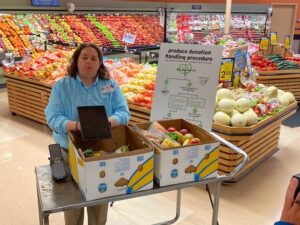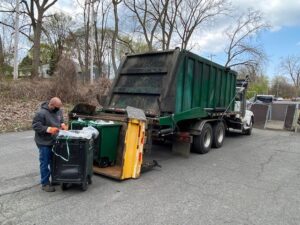- Hannaford Supermarkets Store Manager Jessica Cucchi
- A driver with food waste recycling company Agri-Cycle Energy picks up compost bins filled with food waste.
Hannaford donates and diverts all unsold food, is the first large-scale supermarket retailer in New England and New York to mark this achievement at every store
Zero food waste program kept 65 million pounds of food waste from reaching landfills in 2020
Albany, N.Y. – Hannaford Supermarkets today announced that each of its 183 stores donates or diverts all food at risk of going to waste, sending no food at all to landfills.
The accomplishment, which is the culmination of a decade-long effort, makes Hannaford the first large-scale grocery retailer across its New England and New York market to meet this goal. The accomplishment also highlights that Hannaford is an industry leader in managing food waste and in working to address climate change.
Hannaford achieved the milestone with a multi-pronged approach focused on first preventing food waste through strategic product ordering and management at the store level. Hannaford associates are trained on how to responsibility handle food to avoid damage and exposure to temperature variation.
Each Hannaford store also strictly follows the U.S. Environmental Protection Agency Food Recovery Hierarchy, which prioritizes the rescue of surplus product for donation to food insecure individuals – generating millions of meals donated annually. Other key elements of Hannaford’s food waste diversion program include donations to local farmers for animal feed and food-to-energy conversion efforts.
Hannaford’s adherence to this process kept 65 million pounds of food waste from reaching landfills in 2020.
“The health and well-being of our planet are a top priority for all of us at Hannaford and we recognize that our role in the food supply chain comes with great responsibility,” said Mike Vail, president of Hannaford Supermarkets. “The impact food waste has on our environment cannot be overstated. When we first established this goal, it was with the greater purpose of making a real and positive impact on our communities. Eliminating hunger and food waste are essential to improving the world we live in.”
While food recovery and donation are long-established operational practices at Hannaford, the retailer fully realized the achievement of zero food waste by partnering with Agri-Cycle, a food waste recycling company based in Scarborough, Maine, to turn food unsuitable for human and animal consumption into energy.
A leader of this space in New England, Agri-Cycle’s operation includes a state-of-the-art de-packaging machine that separates expired or damaged packaged food from its container—allowing for easy recycling of food waste that would otherwise end up in a landfill due to its packaging.
Agri-Cycle regularly services Hannaford stores to pick up inedible food, which their anerobic digesters transform into electricity that is sold back onto the grid. The anerobic digestor is located at Agri-Cycle’s sister company – the five-generation family owned-and operated Stonyvale Farms in Exeter, Maine. In addition to energy, a byproduct of the process produces liquid fertilizer as well as bedding for the farm’s dairy cows, resulting in a virtuous cycle.
In New York, Agri-Cycle works with its regional partner Natural Upcycling to regularly service Hannaford stores. Inedible food is delivered to Natural Upcycling’s digester in Utica where the food waste is used to create renewable energy.
“Hannaford is a true sustainability champion with a deep understanding of the challenges regarding food waste recycling. Solutions are never one-process fits all,” said Dan Bell, president and co-founder of Agri-Cycle Energy. “By taking a multifaceted approach, Hannaford ensures they are navigating the food waste hierarchy with intent, maximizing the value of their unsold food by helping to create renewable energy while protecting the environment.”
The partnership with Hannaford has enabled Agri-Cycle to expand its area of operation and make the process more accessible to other companies and organizations in the Northeast.
“Hannaford’s role as a frontrunner in achieving this milestone has allowed Agri-Cycle to gain efficiency of scale and provide food waste recycling services to many other businesses in towns and cities across New England,” said Bell. “Hannaford has had a significant impact not only at their stores, but on hundreds of other food waste producers throughout the region.”
As a Feeding America partner, Hannaford donates as much safe and nutritious food as possible to a network of community pantries, soup kitchens and food banks. According to the Food and Agriculture Organization of the United Nations, up to 40 percent of all food, or enough to feed three billion people, is never consumed. Hannaford stores donated more than 25 million pounds of food, such beef and chicken; fruit and vegetables; pasta and eggs, for local hunger relief organizations in 2020.
Among the thousands of hunger relief organizations benefitting from Hannaford’s food recovery efforts is the Regional Food Bank of Northeastern New York, which conducts regular food pickups from its local Hannaford store.
“Hannaford has been dedicated to recovering food available for donation at its stores to help feed people in need for over a quarter century,” said Joanne Dwyer, director of food industry relations and business development representative for the Regional Food Bank. “In more recent years, Hannaford’s fresh rescue team was created to expand the program. As a result of their focus on achieving zero waste and the daily pickups made by the Food Bank and our partner agencies, over the past five years the 44 Hannaford stores in our region have rescued more than 22 million pounds of wholesome meat, produce, dairy, and other items from going to waste, making it possible for us to provide nearly 18.4 million meals to families. The Food Bank is so grateful for Hannaford’s partnership and congratulates all for this monumental achievement.”
Additionally, Hannaford stores donate food not suitable for human consumption to local livestock farmers, who use the items as feed for cows, sheep, pigs and other animals.
“I feed 90 percent of my pigs from what I get from Hannaford. That’s a huge benefit to me, plus it doesn’t show up in the landfill. Hannaford is a more than just a grocery store. They’re a great neighbor,” said John Rowland, farmer at Bad Flash Brewing Farm in Malden Bridge, NY.
The milestone of sending no food waste to landfills is part of Hannaford’s commitment to sustainability and being Greater than Groceries™.
Leaders and sustainability advocates and experts applauded Hannaford’s innovation, leadership and commitment to impactful sustainability efforts.
“The environmental benefits of reducing food waste are significant in decreasing the amount of material that would otherwise be sent to landfills where it would eventually contribute to climate change by creating methane gas,” said New York State Department of Environmental Conservation (DEC) Commissioner Basil Seggos. “DEC appreciates Hannaford’s efforts to promote sustainability and help feed those in need. As more public and private entities join this important environmental and social welfare cause, we can reduce greenhouse gas emissions by more than 120,000 metric tons, while building stronger, healthier communities.”
“This announcement from Hannaford marks a significant milestone in their effort to reduce food waste and sets an example of environmental stewardship for the food retail industry,” said Albany County Executive Daniel P. McCoy. “Food waste accounts for almost a quarter of the waste going into our landfills and it is critical that we take steps to reduce this number. The good news is we know how to reduce food waste and Hannaford has demonstrated that with a good plan and sustained effort we can all make a difference. What’s even more commendable is that by prioritizing food donations, Hannaford has helped reduce food insecurity during a time of such great need in our community.”
The Environmental Protection Agency estimates that as much as 40 percent of all food in the U.S. is wasted along its journey from farm to table, eventually ending up in landfills and generating harmful greenhouse gases. According to the U.S. Department of Agriculture, the U.S. per capita waste has increased by 50 percent since 1974 and the average person throws away 250 pounds of food per year.
To learn more, view Hannaford’s no food to landfill video at https://bcove.video/3ts7OgD.
For more information about Hannaford’s sustainability efforts, visit www.hannaford.com/about-us/sustainability.
About Hannaford Supermarkets
Hannaford Supermarkets, based in Scarborough, Maine, operates 183 stores in the Northeast. Stores are located in Maine, New York, Massachusetts, New Hampshire, and Vermont. Hannaford employs nearly 30,000 associates. Additional information can be found at Hannaford.com.
About Agri-Cycle Energy
Agri-Cycle, based in Scarborough, Maine is a food waste recycling company that collects food waste and partners with farm-based anerobic digesters across the Northeast to create renewable energy. Agri-Cycle is passionate about working with our customers to achieve their sustainability goals through providing transparent, reliable and effective solutions. Additional information can be found at www.agricycleenergy.com


